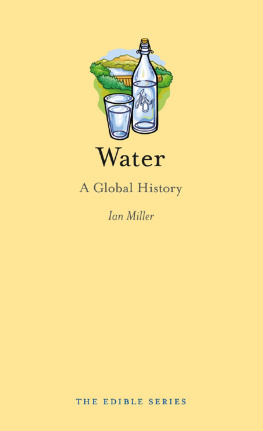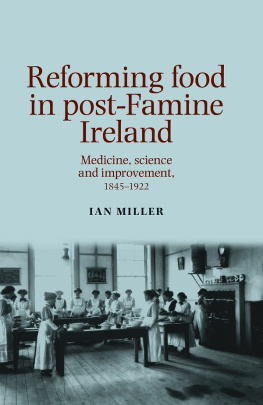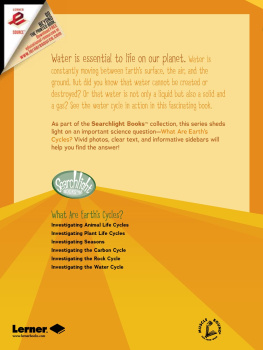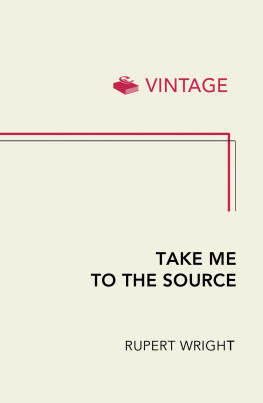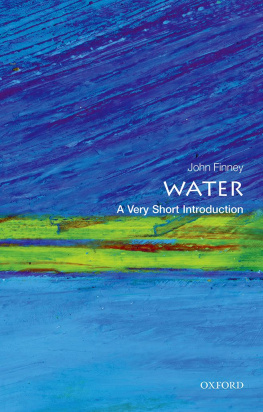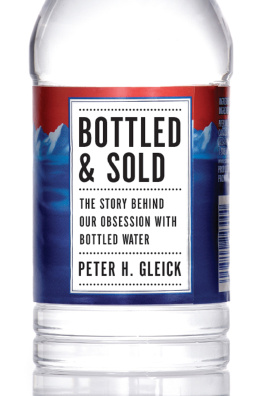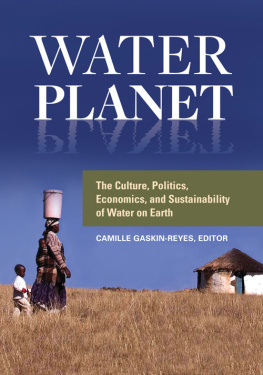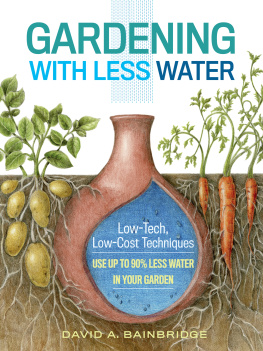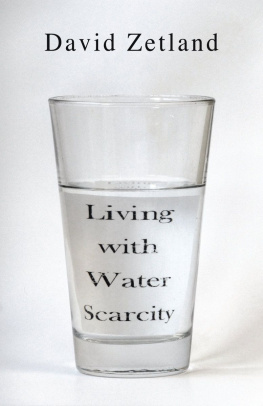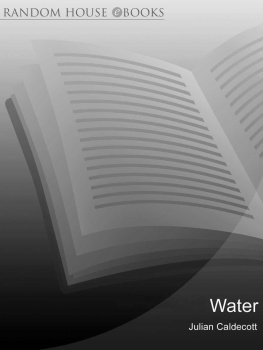WATER

Edible
Series Editor: Andrew F. Smith
EDIBLE is a revolutionary series of books dedicated to food and drink that explores the rich history of cuisine. Each book reveals the global history and culture of one type of food or beverage.
Already published
Apple Erika Janik Barbecue Jonathan Deutsch and Megan
J. Elias Beef Lorna Piatti-Farnell Beer Gavin D. Smith
Brandy Becky Sue Epstein Bread William Rubel
Cake Nicola Humble Caviar Nichola Fletcher
Champagne Becky Sue Epstein Cheese Andrew Dalby
Chocolate Sarah Moss and Alexander Badenoch
Cocktails Joseph M. Carlin Curry Colleen Taylor Sen
Dates Nawal Nasrallah Doughnut Heather Hunwick
Dumplings Barbara Gallani Eggs Diane Toops
Figs David C. Sutton Game Paula Young Lee
Gin Lesley Jacobs Solmonson Hamburger Andrew F. Smith
Herbs Gary Allen Hot Dog Bruce Kraig Ice Cream Laura B.
Weiss Lamb Brian Yarvin Lemon Toby Sonneman
Lobster Elisabeth Townsend Milk Hannah Velten
Mushroom Cynthia D. Bertelsen Nuts Ken Albala
Offal Nina Edwards Olive Fabrizia Lanza Oranges Clarissa
Hyman Pancake Ken Albala Pie Janet Clarkson
Pineapple Kaori O Connor Pizza Carol Helstosky
Pork Katharine M. Rogers Potato Andrew F. Smith
Pudding Jeri Quinzio Rice Renee Marton Rum Richard Foss
Salmon Nicolaas Mink Sandwich Bee Wilson Sauces Maryann
Tebben Sausage Gary Allen Soup Janet Clarkson
Spices Fred Czarra Sugar Andrew F. Smith Tea Helen Saberi
Tequila Ian Williams Truffle Zachary Nowak Vodka Patricia
Herlihy Water Ian Miller Whiskey Kevin R. Kosar
Wine Marc Millon
Water
A Global History
Ian Miller
REAKTION BOOKS
Published by Reaktion Books Ltd
33 Great Sutton Street
London EC1V 0DX, UK
www.reaktionbooks.co.uk
First published 2015
Copyright Ian Miller 2015
All rights reserved
No part of this publication may be reproduced, stored in a retrieval system, or transmitted, in any form or by any means, electronic, mechanical, photocopying, recording or otherwise, without the prior permission of the publishers
Page references in the Photo Acknowledgements and
Index match the printed edition of this book.
Printed and bound in China by Toppan Printing Co. Ltd
A catalogue record for this book is available from the British Library
eISBN: 9781780235622
Contents
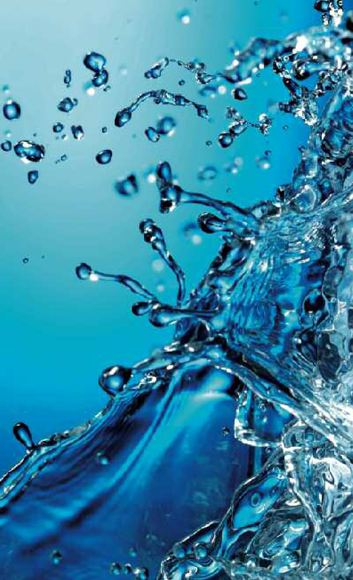
1
What is Water?

Water seems to be diffused everywhere, and to be present in all space wherever there is matter. There are hardly any bodies in nature but what will yield Water: it is even asserted that fire itself is not without it. A single grain of the fiery salt, which in a moments time will penetrate through a mans hand, readily imbibes half its weight of Water, and melts even in the driest air imaginable.
Dr Huttons Mathematical and Philosophical Dictionary (1796)
Water is ubiquitous. Not only does it cover approximately 70 per cent of the worlds surface, but it is considered essential for the survival of all known life forms. The human body is replete with the substance, with a water content as high as 70 per cent. Water aids human digestion, absorbs nutrient, assists blood circulation, removes toxins and regulates temperature. It also transports oxygen to cells and helps to protect joints and organs. Given waters global omnipresence and its vital role in sustaining health, it might be tempting to presume that acquiring access to it for drinking purposes is relatively straightforward. Yet in reality, human societies have faced perpetual difficulties in obtaining consumable water.
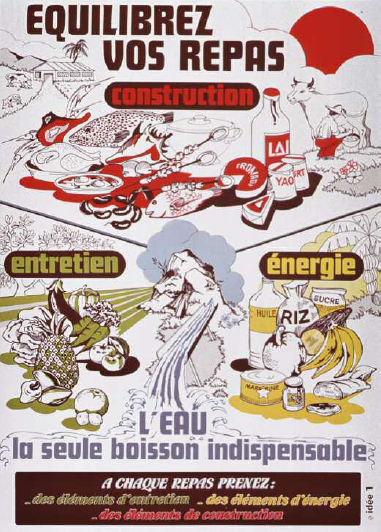
Poster of balanced meals featuring water: the only indispensable drink, Department of Sanitation and Social Affairs, Martinique.
Throughout time humans have invented an array of drinks designed to offer alternatives to water. However, none of these have ever truly proved to be suitable substitutes. Despite the pervasive popularity of beverages including tea, coffee and alcohol liquids denigrated as artificial drinks by nineteenth-century health promoters the healthy digestion of these products has always depended upon the body containing adequate levels of water. Many man-made alcoholic and soft drinks have dehydrating effects.
Nonetheless, despite widespread public awareness of the substances physiological importance, water fails to appeal in quite the same way as these more appetising, tasty drinks. Water has no distinctive smell that draws us to it. Nor is its dull, unexciting and transparent appearance particularly interesting or appealing. The French writer and aviator Antoine de Saint-Exupry recognized this in 1939 when he wrote:
Water, thou hast no taste, no color, no odor; canst not be defined, art relished while ever mysterious. Not necessary to life, but rather life itself, thou fillest us with a gratification that exceeds the delight of the senses.
In essence water is a tasteless mixture of oxygen and hydrogen atoms that are chemically bonded together. Adjust its temperature and it transforms into ice, steam or vapour. When viewed in this somewhat clinical fashion, water hardly presents itself as an appetizing consumable substance. It does little to lift our mood in the way that caffeine-infused drinks do. Nor does it intoxicate us as alcohol does. Instead, thirst and necessity have mostly dictated human decisions to drink water. But water is something more than this strange mixture of elements and has always done something mysteriously fulfilling to our bodies and minds, as Saint-Exupry recognized. The twentieth-century English novelist D. H. Lawrence also appreciated this when he observed that water is H2O, hydrogen two parts, oxygen one, but there is also a third thing, that makes water and nobody knows what that is. Lawrence perceptively understood that despite its seemingly bland nature, water serves a mysterious but important purpose in human existence. Nonetheless its tasteless, odourless appearance makes it something of a curiosity among drinks and profoundly differentiates it from other potable liquids.
From around the seventeenth century health promoters have laboriously striven to impress upon the public a sense of the necessity of regular water consumption. They have done so because of their conviction that we need to drink approximately half the amount of water in our bodies by weight each day. Should these quantities fail to be ingested, so we are frequently warned, chronic cellular dehydration may result, a complaint that weakens immune systems and causes chemical and nutritional imbalance. In response to concerns such as these, we are nowadays bombarded with messages informing us about the particular amounts of water that we should consume and how our bodies will inevitably suffer should we fail to do so.

